Hitachi Deskstar 7K1000 in RAID 0: Is Two Terabytes really better than One?
by Gary Key on April 19, 2007 12:15 AM EST- Posted in
- Storage
iPeak Business Application Tests
Our iPeak Winstone benchmarks offer a glimpse into how well our hard disk drives will handle general office applications, media encoding, and graphics manipulation. While the business applications that are being tested tend to be more CPU bound at times, the performance of the hard drive can and will make a difference in the more disk intensive video and graphics applications where large media files are typically being edited.
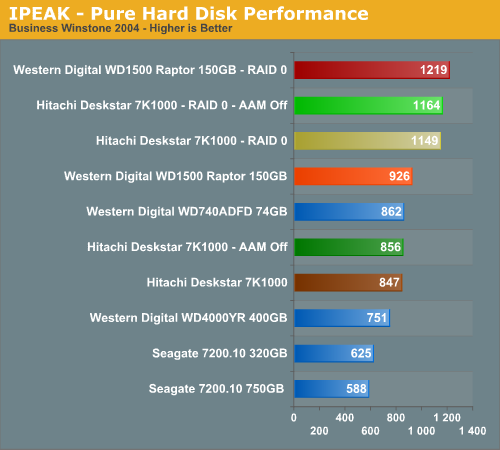
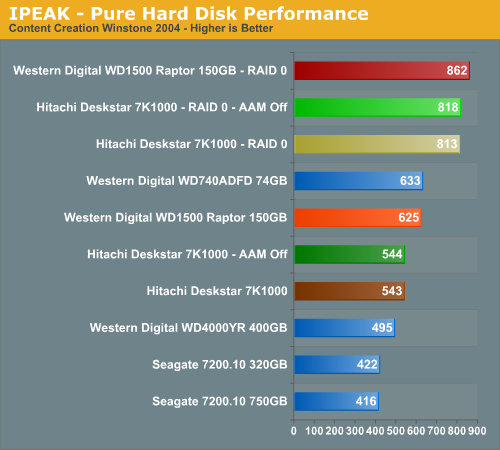
As expected the WD1500 Raptor drives finish at the top in our business application tests as its 10k RPM spindle speed and optimized cache play an important role in its ability to sustain high transfer rates, especially in the Content Creation benchmark where transfer block sizes are significantly larger and more random than in the Business application benchmark. This is true with either a single drive or RAID 0 setup although we see the 7K1000 trailing the WD1500 by less the 5% in these tests. While RAID 0 has the theoretical capability to improve throughput by up to 100% before system overhead, we only see a 31% to 35% improvements in these pure hard disk benchmarks.
iPeak General Task Tests
The iPeak based General Task benchmarks are designed to replicate utility based application tasks that typically are disk intensive and represent common programs utilized on the majority of personal computers. While the WinRAR program is very CPU intensive it will typically stress the storage system in short bursts. Our antivirus benchmark will stress the storage system with continual reads and sporadic write requests while the defragmentation process is split between continual read and write requests.
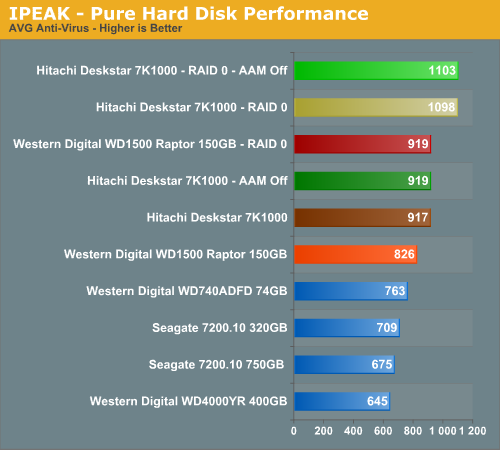
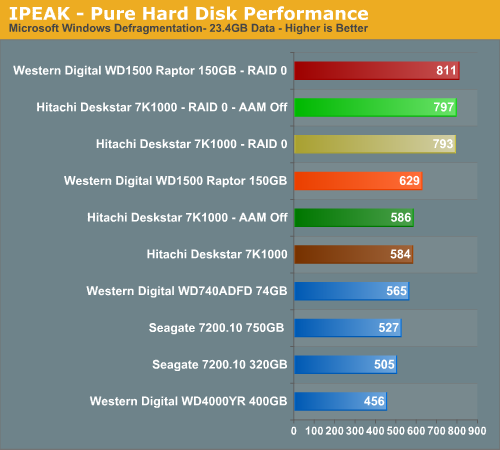
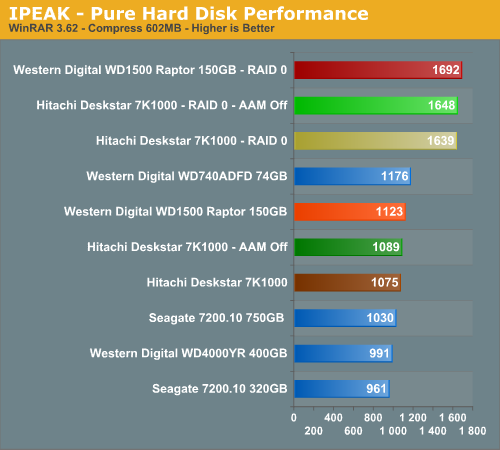
The 7K1000 performs extremely well in the Anti-Virus and Defragmentation test where its 32 MB cache benefits read operations with results that mirror the PCMark 2005 tests. This holds true with the RAID 0 configuration although we only see a 20% improvement in the AVG test results. Also of interest is that in the AVG test we see the Raptor RAID 0 setup score the same as the single drive 7K1000 configuration.
The Raptor holds a small advantage in the Windows defragmentation test in both the RAID 0 and single drive results. The rotational speed of the Raptors just cannot be beat in this test, but the 7K1000s score extremely well due to their cache size.
This is especially true in the WinRAR tests where the rotational and access speeds of the Raptors outperformed the 7K1000 setups in both configurations. In this test, write speeds are very important and we see the RAID 0 setups scoring around 50% better, though we expected better performance based upon the PCMark05 results. However, keep these pure performance results in mind as they will not be repeated in our actual WinRAR tests.
Our iPeak Winstone benchmarks offer a glimpse into how well our hard disk drives will handle general office applications, media encoding, and graphics manipulation. While the business applications that are being tested tend to be more CPU bound at times, the performance of the hard drive can and will make a difference in the more disk intensive video and graphics applications where large media files are typically being edited.


As expected the WD1500 Raptor drives finish at the top in our business application tests as its 10k RPM spindle speed and optimized cache play an important role in its ability to sustain high transfer rates, especially in the Content Creation benchmark where transfer block sizes are significantly larger and more random than in the Business application benchmark. This is true with either a single drive or RAID 0 setup although we see the 7K1000 trailing the WD1500 by less the 5% in these tests. While RAID 0 has the theoretical capability to improve throughput by up to 100% before system overhead, we only see a 31% to 35% improvements in these pure hard disk benchmarks.
iPeak General Task Tests
The iPeak based General Task benchmarks are designed to replicate utility based application tasks that typically are disk intensive and represent common programs utilized on the majority of personal computers. While the WinRAR program is very CPU intensive it will typically stress the storage system in short bursts. Our antivirus benchmark will stress the storage system with continual reads and sporadic write requests while the defragmentation process is split between continual read and write requests.



The 7K1000 performs extremely well in the Anti-Virus and Defragmentation test where its 32 MB cache benefits read operations with results that mirror the PCMark 2005 tests. This holds true with the RAID 0 configuration although we only see a 20% improvement in the AVG test results. Also of interest is that in the AVG test we see the Raptor RAID 0 setup score the same as the single drive 7K1000 configuration.
The Raptor holds a small advantage in the Windows defragmentation test in both the RAID 0 and single drive results. The rotational speed of the Raptors just cannot be beat in this test, but the 7K1000s score extremely well due to their cache size.
This is especially true in the WinRAR tests where the rotational and access speeds of the Raptors outperformed the 7K1000 setups in both configurations. In this test, write speeds are very important and we see the RAID 0 setups scoring around 50% better, though we expected better performance based upon the PCMark05 results. However, keep these pure performance results in mind as they will not be repeated in our actual WinRAR tests.










48 Comments
View All Comments
MadAd - Saturday, April 21, 2007 - link
<quote>Sorry but saving even 5 secs out of 10, 5 times a day is not work the extra money to me</quote>I take it you dont play battlefield 2 then. Having just two or three seconds advantage on each mapchange can mean the difference between a round flying a jet or helo, or a few seconds later watching everyone else fly off and being left with a humvee (if you are very lucky) or nothing at all.
Of course not all games have this problem however with bf2 when there are 32 players a side and only 2 jets each then its the quickest in that gets first picks, and if it takes running raid 0 just to pick up that extra second or two, then so be it.
ShadowdogKGB - Saturday, April 21, 2007 - link
My four little Hitachi 80gigs in R0 will load the single player Daging Oilfields in 18-20 seconds. Hows that for real world performance. Or maybe somebody from the church of the anti-raid can explain that away for me. My point of contention from this article is that the author went out of his way to denigrate the concept of raid. And another point is that you don't buy a 1 terabyte hard drives just to put them in raid, and especially put them in raid 0. These babies are for storage. You're definitely are not going to want 2 Terabytes of data sitting on a fragile Raid 0. No, this article is just plain skewed. Now there's gonna be a bunch of knuckle heads pointing to these benchmarks and saying "See? See? I told you so!" Yeah, HL2 Lost Coast. That's not even a real game. And The Sims2? Oh please. Yeah that's real world performance figures right there. Bleh. I'm no programmer or mathematician but I could have done a more decent article on this subject than this amateur.Axbattler - Friday, April 20, 2007 - link
I do not buy the 'extra money' argument that much (**). It's not like performance is the only (*possible) gain from striping two drives. The second drive get you extra capacity, and as long as people choosing to go RAID-0 are using the extra space, then they are not paying a financial premium over buying two drives and running them separately (unless they need to purchase a RAID controller). To me, the main cost from going RAID-0, is the added risk in case of failure.* Though I am in the school of thought that RAID-0, do not provide significant performance boost in the majority of the cases, I do find gains more often than penalties (from overhead).
Regarding from the article results, I am not surprised by the game loading results. I do, however suspect that the performance benefit of RAID-0 may be more noticeable in XP boot up time however (whether that is important enough, I'll shrug to it. Not my cash).
The file copy result make me wonder if there is not a bottleneck elsewhere though.
7.55 *1024 / 100 = 77.312 MB/sec on average. That's the transfer rate of a single drive.
** I do make an exception to people stripping Raptor's. I can't think of many desktop users who have enough 'performance sensive' applications (OS, apps, games - as opposed to multimedia files for instance) they use regularly - so much that they would need a second Raptor in the same rig. I do suspect that those users are really going for the bragging right rather than the 'free performance'.
Lastly, I wonder if RAM Disks, in their current form, are really faster the fastest SCSI drives at loading games. I seem to remember benchies of i-RAM some time ago showing it to edge the 150GB Raptor by not that much.
Griswold - Thursday, April 19, 2007 - link
Absolutely agree. The only winner is the storage industry.gramboh - Thursday, April 19, 2007 - link
No kidding, been waiting for the Seagate for a while. It will also be nice to see 250GB platters (x4) on a 1TB drive. I'm running 2x 7200.10 500's right now and am happy with them. I'd like 1TB to come out to push drive costs down so I use a few for external back-up.BoberFett - Thursday, April 19, 2007 - link
Anybody who stripes drives of this size is asking to lose a lifetime's worth of data. Even assuming it's data than can be reassembled such as ripped or downloaded music and movies, the time required to reassemble that data is pretty significant.goinginstyle - Thursday, April 19, 2007 - link
Glad to see you guys still telling it like it is with RAID 0. I am just waiting on the comments to come in from people who swear it lets them operate their systems at light speed. This drive seems to be really nice but I will wait for the Seagate 1TB to come out before making an upgrade decision. When is it coming out?Gary Key - Thursday, April 19, 2007 - link
The Seagate 1TB drives are due out in four to six weeks according to the last information we had from them.